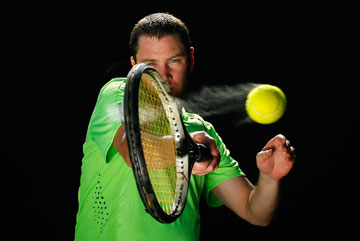 A quality sports performance requires a positive attitude, determination and maximum effort. However, giving 110% doesn’t always yield superior results when vision skills are lacking. “An athlete who is not visually fit, is not physically fit,” according to Dr. James Morris of the National Academy of Sports Vision.
A quality sports performance requires a positive attitude, determination and maximum effort. However, giving 110% doesn’t always yield superior results when vision skills are lacking. “An athlete who is not visually fit, is not physically fit,” according to Dr. James Morris of the National Academy of Sports Vision.
If your child is involved in sports, you know the importance of good hand-eye coordination. Without it, your child cannot cleanly catch a ball, throw an accurate pass, put the bat on the ball, or swish consecutive free throws.
Hand-eye coordination is self-explanatory. The hands and eyes must coordinate together to accomplish a skill. How well that skill is achieved depends on the strength of the visual connection from your eyes to your brain to your hands. Practice and hard work can improve that connection for some athletes; vision therapy can improve it for all of them.
Vision therapy, similar to physical therapy for a sports injury, trains the brain to control the eyes to work together at optimal capability. Athletes with good skills can also benefit from improving vision efficiency and hand-eye skills.
Exceptional hand-eye coordination is often found in professional athletes. Larry Fitzgerald, NFL wide receiver who achieved fame in Super Bowl XLIII with the Arizona Cardinals, credits his grandfather, a developmental optometrist, for his extraordinary hand-eye coordination. As a child, Fitzgerald had difficulty paying attention in school and struggled with homework. His grandfather, Dr. Robert Johnson, diagnosed a vision problem that was affecting his near-vision (reading) capabilities. Fitzgerald was put through a vision therapy program of hand-eye coordination drills, among other activities and exercises. The results were improved grades in school, and later, the ability to catch a football better than most people.
Whether the sport is baseball, soccer, volleyball, basketball, softball, football, hockey or golf, athletes are discovering the benefits vision therapy can have on their performance.
Public misconception is that 20/20 eyesight is “perfect vision”, but it actually refers only to distance eyesight. There are approximately 15 near-vision skills needed to read, as well as succeed in sports. Those skills are not tested for in a basic eye examination by most doctors. However, a developmental optometrist can test them in a developmental vision evaluation.
Vision skills needed to play sports include focusing, eye teamwork, depth perception, eye tracking and peripheral vision. If these skills are deficient, a child might frequently:
- Strike out in baseball
- Drop passes in football or basketball
- Miss short putts in golf
- Throw inaccurate football passes
- Have a poor shooting percentage in basketball
- Trip over his skates in hockey
- Stumble doing a pompom routine
- Consistently misjudge hitting a tennis ball
General indications a child may have a vision problem are:
- Poor balance, clumsy or “accident-prone”
- A step slow, reflexes not sharp
- Rhythm and timing off
- Poor hand-eye coordination
- Reduced concentration
- Inconsistent performance
- Headaches, fatigue, frustration when playing sports
- Little improvement with practice
- Routinely makes errors
- Often sits on the bench
If any of these situations apply to your child, a developmental optometrist can test for vision problems which may be contributing to sports woes. Problems focusing, one eye overworking, misaligned eyes or eyes not working together are possible issues. Once a diagnosis is made, the doctor will recommend a program of vision therapy which can include computer games, drills with balls and other objects, as well as activities with prisms and lenses.
Syntonic phototherapy is also proving helpful for athletes. This involves wearing various colored lenses at certain times daily. Light therapy helps relax and retrain the eyes to work together better.
Most athletes evaluate their sports adeptness on a regular basis and are always looking for ways to tweak it. Vision therapy can help improve skills for all sports and can even be tailored to the individual sport. If your child enjoys athletics but struggles with some key performance abilities, consider having him evaluated by a developmental optometrist. It may be that an undiagnosed vision problem is keeping him from being the best athlete he can be.
To schedule a vision evaluation, or for more information about the benefits of vision therapy and light therapy for athletes, give us a call!